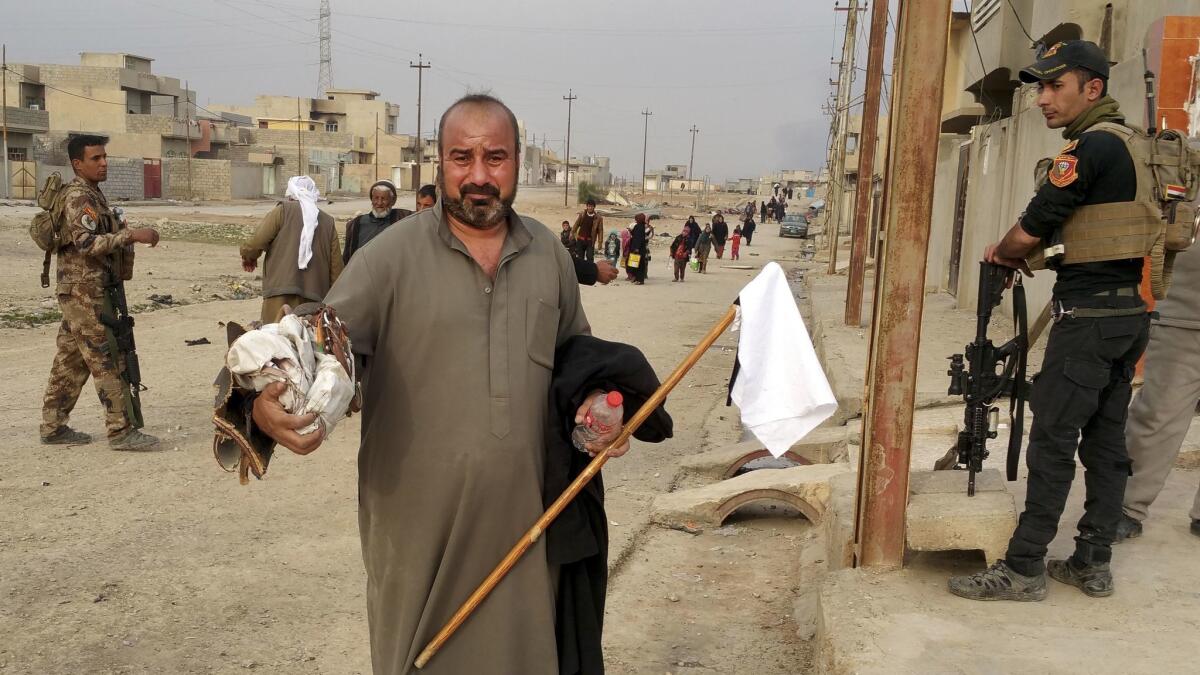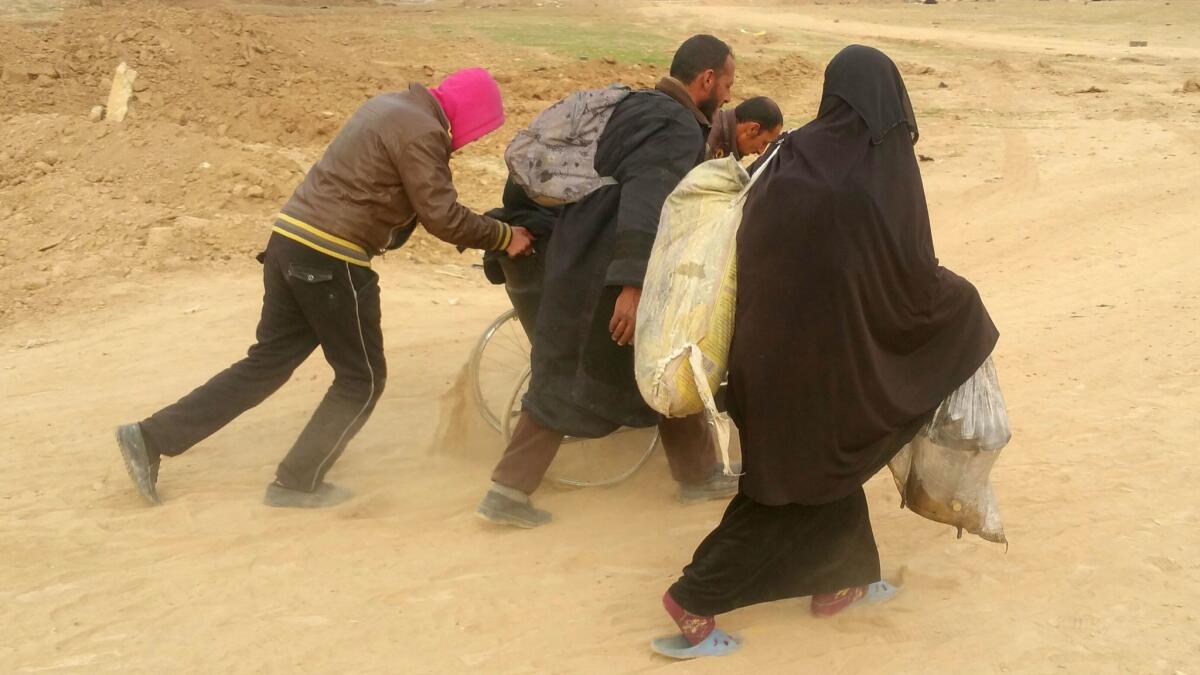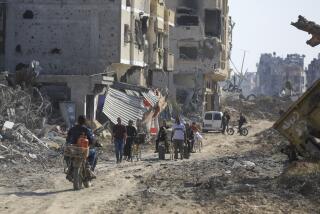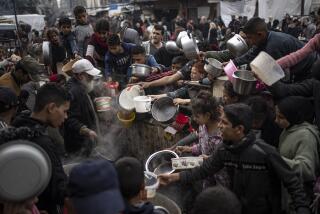Iraq’s offensive against Islamic State militants in western Mosul sends thousands on trek for safety

Residents of Mosul flee ahead of the fighting.
The Islamic State mortar shell slammed into the ground in a puff of white smoke, exploding a mere 30 yards away from the dirt path leading out of western Mosul’s Al-Maamoun neighborhood.
Residents already fleeing the city realized it was time to run.
“Quick, quick, yalla,” shouted an Iraqi soldier, frantically waving his arms at a gaggle of families struggling to push their belongings along the path.
Behind them, Al-Maamoun was shrouded in smoke, the rat-tat-tat of heavy machine guns echoing through the area.
“Around now is when they start sending the [mortar fire]. There will be others. People have to hurry,” the soldier said.
As Iraqi security forces have breached Islamic State-held neighborhoods of western Mosul, thousands of residents have seized the chance to escape in the ensuing chaos rather than stay while militants keep fighting.
The International Organization for Migration, one of several humanitarian agencies keeping track of population movements in the area, said in a report released Wednesday that some 21,000 people had been displaced since the government offensive to take back western Mosul began Feb. 19.

As the clashes have shifted past smaller areas into western Mosul proper, there has been a spike in displacement. Since Saturday, approximately 4,000 people have left the city each day, the highest the rate has been since the campaign to drive the jihadists kicked off in October, according to the U.N.’s Office for the Coordination of Humanitarian Affairs.
In January, Iraqi troops backed by a U.S.-led international coalition drove the jihadists out of Mosul’s eastern districts. The troops halted their campaign on the banks of the Tigris River, which bisects the city, while they regrouped. They started the fresh assault in February with the aim of driving out Islamic State from its last major bastion in the country.
The U.N. estimates some 750,000 people remain in Islamic State-held areas of western Mosul. An estimated 400,000 of them may flee to camps set up by the government as well as numerous aid agencies near Mosul, officials say.
Residents looking to leave Mosul face a journey that begins with a gantlet of mortar fire, IEDs and sniper bullets.
At times, men, their faces tight with worry, cajole weary women and whimpering children through the active war zone their neighborhoods have become. Families walk past the bodies of Islamic State fighters as well as residents felled by the fighting.
“We’ve heard stories of people tranquilizing their kids or putting duct tape on their mouths to stop them from making any noise as they make their escape from Islamic State,” Hala Jaber, Iraq press officer for the International Organization for Migration, said in an interview Wednesday.
Despite Iraqi forces this week declaring Al-Maamoun mostly secure, a video released Monday by Amaq, an agency affiliated with Islamic State, shows militants running through Al-Maamoun and the Uboor area of western Mosul, firing their weapons as they shout “Allah Akbar [God is great].”

Militants are seen in the video firing a Dushka machine gun set up in the bed of a pickup truck and high-caliber rifles from inside houses.
Outside Al-Maamoun on Tuesday, it appeared the neighborhood and its environs were still contested.
Residents often bury family members killed in the fighting in hastily dug graves in front yards or on the sides of the road.
Abu Barzan Hadidi, a 43-year-old taxi driver from Al-Maamoun, said he had just finished digging a grave for his daughter, Nadia Bilal, and his 1½-year-old granddaughter, Hanaan.
“I buried them with my own two hands,” Hadidi said.
“A mortar [shell] fell on them,” he said. “Her husband went ahead to the camps. He doesn’t know yet.”
He returned a shovel to the soldiers stationed near the dirt path out of Al-Maamoun, tears rolling down his nut-brown cheeks.
“He’s not the only one who had to do this today,” said one soldier as he watched Hadidi walk away, saying that he too had buried a corpse hours earlier.
Militants forced many residents to leave their cars, some destined to be used as car bombs.
After they leave their neighborhoods, those fleeing must traverse the sand-swept valleys and hills outside the city. They trudge through the desert, forming a dust-covered line that stretches for three miles before reaching a gathering area near the Baghdad-Mosul highway.

On Tuesday, many people struggled to roll pushcarts with older family members and baggage down a hill, passing near a tank that had fallen into a trench. An old woman, too tired to continue, sat cross-legged on the sand as family members tried to determine how far they would have to go to reach military trucks transporting people to safety.
Abdullah Fathi, 17, struggled to push a blue cart carrying his grandmother, Farhah Amin, to a field hospital.
“She fainted. She just couldn’t take the trip,” he said as a medical officer ordered staff to put Amin on a stretcher.
For many displaced people destined for camps, the main concern was food and water. People spoke of horrific levels of deprivation, with exorbitant prices in western Mosul making even the most basic of goods out of reach.
Moza Khudhayer, an outspoken matriarch of a family from the Uboor area of Mosul, sat on patterned thatch mats among her daughters and their children, relishing packets of biscuits and stew with rice given to them by aid groups.
“The [Islamic State] killed us, may Allah kill them,” she said. “We’ve spent a month without gas, and we’ve eaten nothing.”
In another area, a group of men squatted on the ground before a seated intelligence officer clad in the black uniform of Iraq’s counter-terrorism service.
The men, whose ages ranged from teenagers with a wisp of facial hair to those sporting beards, had been separated from their families while they awaited security screening.
“You, the one who’s laughing, what’s so funny?” the intelligence officer asked a teenager who moments before had smirked. The teen quickly apologized.
Earlier, another group had lined up in single file, 10 at a time, before another intelligence official with a laptop. They would go forward one by one and present their white government-issued rations card to the officer, who would tap their name into a security database.
“Roughly 10% of the men we check are from Daesh, and they don’t know we have all this material on them,” said the intelligence officer, a captain who declined to give his name for security reasons. He used the group’s Arabic acronym, which is considered a pejorative by its supporters.
“We have a database with all the names of Islamic State members and collaborators, and when we took the eastern side we scooped up records kept by Islamic State…. They had the full names of fighters, their nom de guerre, salaries… everything.”
Some of those who are caught, he said, pretend to have been forced to work with the extremist group, which had reigned over Mosul since June 2014 when it swatted away tens of thousands of Iraqi army troops.
Those who pass this screening are then sent to the nearby village of Hamaam Al-Alil for a more thorough check, said Brig. Gen. Salman Hashem, who oversees the aid distribution in the area. Those with clean records are then reunited with their families at one of the displacement camps.
Although figures on casualties among the displaced are not available, aid groups expect that as Islamic State is cornered in the city, it will get worse for civilians still in their grip.
“Islamic State is not going to go away easily,” Jaber said. “They’re going to play dirty, and they’re going to play dirty against the civilians.”
Bulos is a special correspondent.
ALSO
Who’s tracking casualties in Iraq? A California high school teacher
Two Taliban bombings in Kabul come after U.S. kills senior militant commander
Dozens dragged from their homes as police clear illegal settlement in West Bank
More to Read
Start your day right
Sign up for Essential California for news, features and recommendations from the L.A. Times and beyond in your inbox six days a week.
You may occasionally receive promotional content from the Los Angeles Times.







